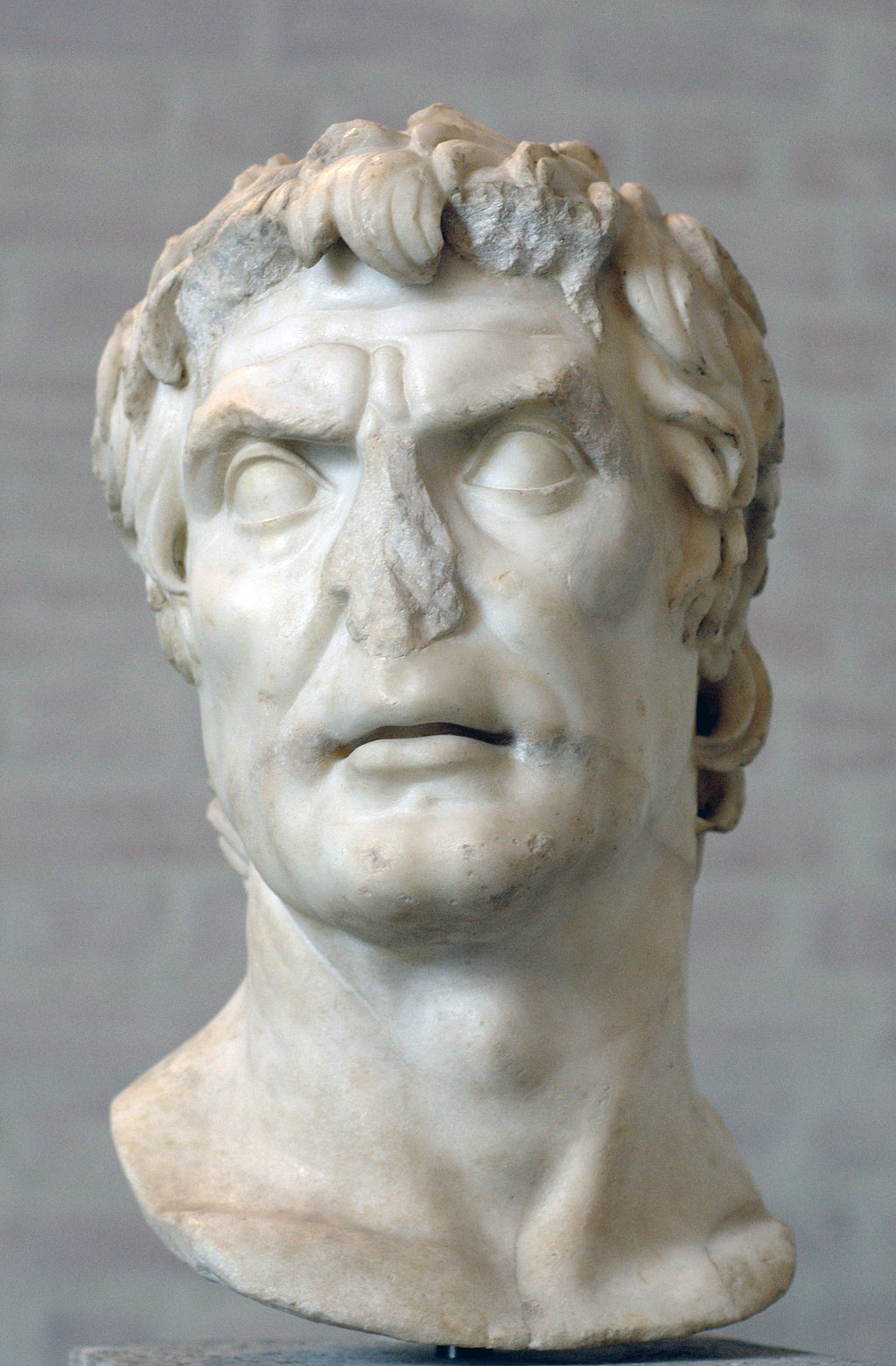Lucius Cornelius Sulla
The enemy of Marius who instigated a series of civil wars, which marked the beginning of the end of the Roman Republic.
 He was born in 138 BCE. As a youth, he lived a rather “unruly” lifestyle, associating with the comics, actors, lute-players, and dancers -- those, whom Romans looked down upon. In 106BCE, as quaestor, Sulla was sent to aid Marius during the Jugurthine War. Sulla persuaded
of Mauretania to betray
Jugurtha and helped bring a decisive end to the war. However,
Marius took credit for this deal since he was the overall commander.
He was born in 138 BCE. As a youth, he lived a rather “unruly” lifestyle, associating with the comics, actors, lute-players, and dancers -- those, whom Romans looked down upon. In 106BCE, as quaestor, Sulla was sent to aid Marius during the Jugurthine War. Sulla persuaded
of Mauretania to betray
Jugurtha and helped bring a decisive end to the war. However,
Marius took credit for this deal since he was the overall commander.
Later in 104 BCE, when the Germanic-Gallic alliance threatened Rome, Marius led the campaign against them and Sulla served as a military tribune. In 99 BCE, he failed to be elected praetor, though he succeeded in 98. In 97 BCE, he was named praetor urbanus, and in 95 BCE, he was appointed as proconsul to the province of Cilicia (in Anatolia). During this time, a prophecy foretold that he would die at the height of his fame and fortune. This prophecy would have a huge impact on Sulla’s actions from this point on.
In 94 BCE, he returned to Rome and allied himself with the Optimates, who opposed Marius. During the Social Wars, Sulla proved his competence as a military general. He was awarded the Corona Obsidionalis (Blockade Crown) and the Corona Graminea (Grass Crown), which was awarded for saving a legion or army in the field. It was the highest military honor and had to be awarded by the soldiers themselves. In 88 BCE, he was elected consul for the first time.
After his consulship, he set off to confront Mithridates in the First Mithridatic War. However, just as he was setting out, the Senate reversed itself and gave command to Marius. Sulla then marched on Rome. No general before him had crossed into the city limits with his army. Sulla quickly drove Marius and his forces out of the city. He first reestablished his power and strengthened the city before returning to the East. Marius, with the help of Lucius Cornelius Cinna, once again took control of the city. Marius declared Sulla’s reforms and laws invalid and exiled Sulla.
When Sulla had arranged a treaty with Mithridates and heard that Cinna had been killed by his men, he began to march back to Rome. In 83 BCE, he marched into Rome. He first faced the consuls, Lucius Cornelius Scipio Asiaticus (Asiagenus) and Gaius Norbanus. In 82 BCE, he faced Papirius Carbo and Gaius Marius the Younger. On November 1 of 82 BCE, Sulla’s forces met those of Carbo’s outside the Colline Gate. In the end, some 50,000 combatants are said to have lost their lives, and Sulla stood as victor.
At the end of 82 BCE or the beginning of 81 BCE, he was named dictator legibus faciendis et rei publicae constituendae causa, “dictator for the making of laws and for the establishment of the republic.” He was given singular power over the republic of Rome. During his reign, there were a series of proscriptions, in which those, who he viewed as “enemies of the state” were executed. Many of those on the list had been placed there so that their property could be seized. Some 1,500 nobles were listed, and this purge went on for several months.
As an Optimate, Sulla moved to strengthen the aristocracy. For example, he deprived the Tribunes of power as well as prestige by removing their ability to both initiate and veto legislation and by preventing former tribunes from holding other political offices. He also increased the size of the Senate and increased its prestige by transferring the control of the courts to the senators. He also codified the cursus honorum, establishing the ages and levels of experience that one had to reach before running for a certain office. He also expanded the “pomerium” or sacred boundary of Rome.
However, at the end of the year, Sulla resigned the dictatorship, disbanded his legions, and reestablished the typical Roman government. He ran for consul in 80 BCE and received the position. After this term, however, he withdrew to his country villa and remained out of the day-to-day political activities in Rome. He died several years later in 78 BCE.
→ Attalus Entry: Lucius Cornelius Sulla Felix1
→ Smith Entry
→ Wikipedia Entry